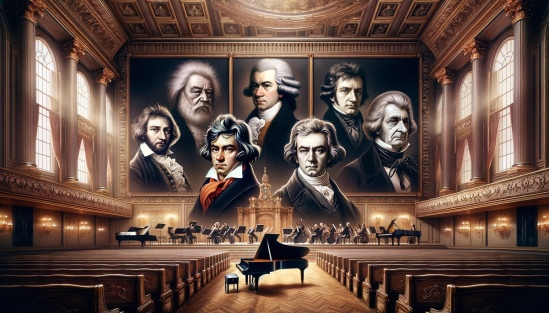
Zelenka
Jan Dismas Zelenka lived from 1679 until 1745.. He was a Bohemian composer who played the double bass in the royal orchestra in Dresden. He was despatched for study in Italy, eventually returning to spend the rest of his life in the Saxon capital. It was expected that he would succeed Heinichen as court Kapellmeister, but the position went, instead, to Hasse, and Zelenka remained, now as Church Composer, a position of much less importance. He won the admiration of distinguished contemporaries, such as Johann Sebastian Bach, for his use of counterpoint, his harmonic imagination and originality, and made some use of Bohemian folk elements.
Zelenka’s orchestral compositions include a set of five Capriccios, among other compositions in the musical idiom of his time.
Much of Zelenka’s surviving work is in the form of sacred vocal music, settings of the Mass or of movements from the Mass, of psalms and of canticles.
Zemlinsky
Alexander von Zemlinsky lived from 1871 until 1942. He was encouraged by Brahms and to some extent by Mahler. He taught Alma Mahler and assisted his brother-in-law Schoenberg in his early years.
His style represents post-Wagnerian romanticism, evident in his symphonies, while another aspect is evident in his ballet based on Hugo von Hoffmannsthal’s Der Triumph der Zeit.
Ziegfeld
Florenz Ziegfeld, Jr. was a theater manager and producer who was born in Chicago in 1867. He was best known as creator of the Ziegfeld Follies in 1907, but he was also responsible for many other Broadway productions, staged after 1927 in the Ziegfeld Theatre. Ziegfeld’s shows were opulent events, featuring beautiful women and rich settings. He was an extravagant character himself. Ziegfeld was married first to actress Anna Held, then to comedienne Billie Burke. He died in 1932.
Zimmermann
Bernd Alois Zimmermann lived from 1918 until 1970. He occupies a special position in German music of the twentieth century because his musical language and techniques relatively original. For much of his career he taught at the Cologne Musikhochschule, drawing, in his music, on his own wide cultural background and his own roots in Catholic teaching and tradition.
Die Soldaten has been considered by many to be the most improtant German oepra since Berg’s Lulu.
Zimmermann’s orchestral works include concertos for violin, for oboe, for strings and for orchestra, with Canto di speranza (Song of Hope) for cello and orchestra.
